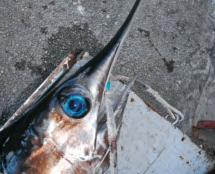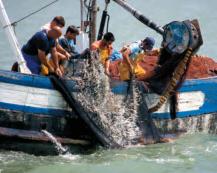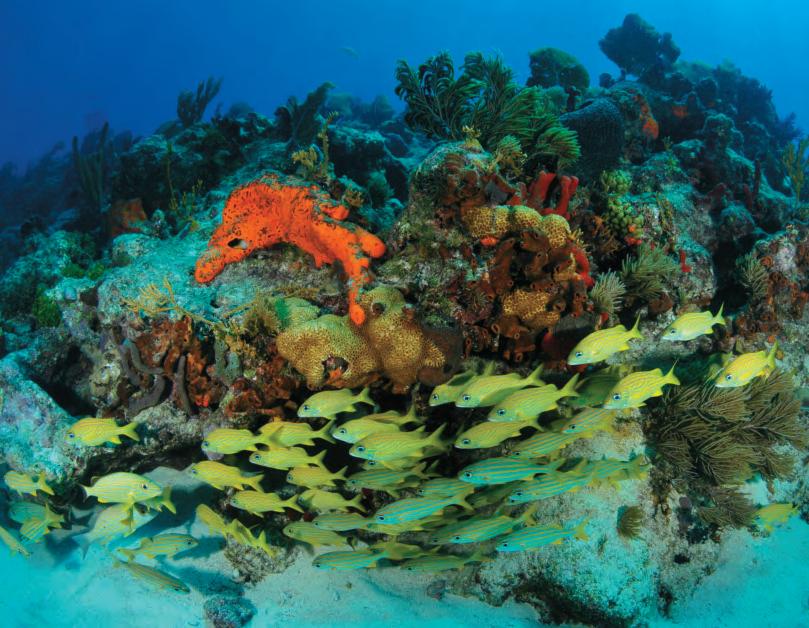
7 minute read
Letter from the CEO
Thomas Huxley, the early defender of Darwin, was certain that the sea was inexhaustible. His thought is perhaps not surprising. The ocean covers 71 percent of our planet at an average depth of more than two miles. In this almost unimaginably large liquid dimension, life not only began, it also generated the vast majority of its creations. Nearly every creature that has ever lived on Earth lived in the ocean. We land dwellers are the historical exception.
Sadly, today we are in the final stages of proving Huxley wrong. The scientists at the Food and Agricultural Organization of the UN report that three-quarters of the world’s commercial fisheries are now overfished or fully fished. And so we risk becoming the generation that denies our children and grandchildren the essential food, jobs and joys of a healthy ocean.
The good news in this potentially devastating global moment is that we know what to do to restore abundant oceans. Not only that, at Oceana, we are doing it. We are not just raising the alarm. We are winning policy changes that restrain shortsighted industrial fishing practices and stop ocean pollution. This annual report lists our most recent set of victories. It will give anyone who loves the oceans – and if you have read this far you must be one of us – solid reason for hope.
Oceana is proving that the ocean can be saved, one victory at a time. The most important parts of the ocean, both ecologically and commercially, are coastal. Coastal zones are controlled, out to 231 statute miles, by coastal nations. That means that policy victories like those reported here – in Chile, Belize, the United States and the European Union – are the building blocks that will eventually save the world’s oceans. In 2010, we achieved a number of victories for the oceans around the world. They include:
• Eight months after the Deepwater Horizon blowout, the United States’ worst oil disaster, the Obama administration protected thousands of miles of U.S. beaches and fisheries from the risks of offshore drilling. • Together with the government of Belize, we protected one third of the second largest reef in the world from a highly destructive form of commercial fishing. • With the government of Chile, we set up the fourth largest no-take zone in the world, protecting a vast area of untrammeled and abundant ocean. • In Europe, we won enforcement of a ban on driftnets, a type of fishing gear infamous for drowning marine mammals.
And we did all that (and more) in just one year. If you are one of our benefactors or supporters, you have much to be proud of. All these victories are possible only thanks to your support.
I hope you will read these pages with growing optimism. Together, we can and will save the oceans. Thank you for your continued generosity.
For the oceans,
Andrew F. Sharpless Chief Executive Officer
A LEAdER FOR THE OCEAns
Oceana has been fortunate to have the support of some incredible people on our Board of Directors. I’d like to recognize one in particular in what I hope will be a series of profiles in annual reports to come.
Dr. Kristian Parker’s dedication to ocean conservation dates to his school days. He holds a doctorate in environmental sciences from Duke University and studied larval settlement behavior at the Kewalo Marine Laboratory in Hawaii. His interest in marine science, coupled with a dedication to saving the oceans, made him a perfect match for Oceana when it was created in 2001. Since then, Kristian has served on our Board of Directors, and in 2010, he became our chairman.
He has also been closely involved in the Oak Foundation’s environmental program since its inception in 1998. Kristian has provided leadership and strategic direction for the Foundation’s work to combat climate change and overfishing.
Kristian’s lifetime commitment to the oceans inspires me as I continue to push for the policy changes that will make our oceans healthy and sustainable for future generations. I welcome him as our new chairman and look forward to another decade of saving the oceans.
- Andy
OCEAns On THE BRInK
The oceans are vast, but they are not immune to human influence. We have already altered or destroyed many marine ecosystems and driven many species to the edge of extinction. According to a study published in Science, less than four percent of the oceans remain unaffected by human activity.

© OCEANA | Jesús Renedo
WE ARE TAKInG TOO MAnY FIsH OUT OF THE WATER
In the last few decades, commercial fishing has evolved into a high-tech, heavily subsidized industry that uses cuttingedge electronics, computer systems, huge amounts of fuel and miles of gear to find and catch more fish in remote places formerly out of bounds to fishermen.
According to research by Dr. Daniel Pauly, a leading fisheries scientist and an Oceana board member, global seafood catch peaked in the late 1980s and has been declining ever since. The U.N. Food and Agricultural Organization says that threequarters of seafood species are overexploited, fully exploited or recovering from depletion. At the same time, marine predators like dolphins are at risk when they can’t find food to eat.
Destructive fishing practices that include diagonal-mesh driftnets, longlines with lethal hooks and bottom trawls are ruining ocean ecosystems by indiscriminately killing fish and other wildlife, including seabirds and marine mammals. Each year, more than 16 billion pounds of unwanted fish and other wildlife are thrown overboard. Bottom trawls drag heavily weighted nets along the ocean floor in search of fish or crustaceans in a practice akin to clearcutting a forest in order to catch a rabbit. Centuries-old habitats such as coral gardens are destroyed in an instant by bottom trawls, pulverized into barren plains. Meanwhile, offshore fish farming, rather than taking the pressure off wild seafood species, results in increased overfishing to feed the farmed fish as well as the despoiling of seafloor habitat. Tons of concentrated fish waste dropped from the open-water pens blanket the ocean bottom, snuffing out oxygen and life.


WE ARE POIsOnInG THE OCEAns WITH FOssIL FUELs
Since the Industrial Revolution, the oceans have absorbed 30 percent of the carbon dioxide put into the atmosphere, moderating and masking its global impact. Now, the oceans take in 11 billion metric tons of carbon dioxide per year and the amount released grows 3 percent annually. The rising amounts of carbon dioxide are dramatically impacting and changing the oceans.
Increasing levels of carbon dioxide in our oceans make it difficult for coral reefs, phytoplankton and shellfish to form the shells they need to survive. This includes many animals that are the base of the marine food chain and therefore critical to the oceans’ overall health. Coral reefs in particular, the nurseries of the seas and home to a quarter of all marine life, could be devastated by acidifying oceans.
Silently, the oceans are warming because of global climate change. Shrinking ice caps give way to warmer ocean water in a vicious cycle of rising temperatures that has resulted in record reductions of sea ice, and stranded polar bears, in the Arctic. Globally, the warming oceans cause sea levels to rise, alter ocean circulation and disrupt entire marine ecosystems.
In addition, we are placing ocean ecosystems at immediate risk with offshore drilling for fossil fuels. In 2010, the U.S. saw its worst offshore drilling disaster in history when the Deepwater Horizon rig exploded and released 171 million gallons of oil into the Gulf of Mexico. The government is poised to allow expanded offshore drilling in the U.S. Arctic – a part of the ocean so remote and fragile that the prospects for a successful recovery operation are slim.
© OCEANA
WE ARE RIsKInG A CRITICAL sOURCE OF FOOd And JOBs
Over a billion people rely on fish as their primary source of animal protein, and yet we are poisoning seafood with mercury, a toxic pollutant emitted by land-based industry. According to a scientist with the U.S. Environmental Protection Agency, one in 10 American women has enough mercury in her blood to pose a risk of neurological damage to her developing baby.
In addition, the livelihoods of some 200 million people are tied to the oceans, from fishermen to beach lifeguards.
The oceans are an invaluable resource for humankind – one that we can’t afford to squander.
THE GOOd nEWs
SAVING THE OCEANS IS POSSIBLE IN OUR LIFETIMES.










